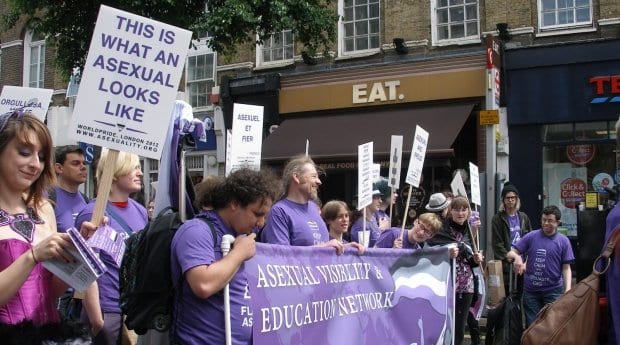If WorldPride is all about celebrating sexuality, you might think people who never have sex would want to stay at home. But asexuals belong in the LGBT community, too, says Michael Doré, head organizer of an asexuality conference taking place in Toronto during WorldPride week.
“We’re a part of sex and gender diversity,” he says. “It’s almost the other side of the coin from being able to have sex with whoever you want. It’s being able to have sex with nobody.”
The International Asexuality Conference, at Ryerson University on June 28, will bring together more than 200 asexuals from at least four continents — the largest gathering yet. Organizers are seeking to spread the word about asexuality and hope that the conference coinciding with WorldPride will display the bonds between asexuals and other sexual minorities.
Doré says that just because gay events often focus on sexuality, while asexuals avoid it, does not mean the two are natural enemies.
“Asexuality is not the same as hating sex,” he says. “Some of us are actually very sex-positive. Sex is fine by me, as long as I’m not involved.”
In fact, he says, the complexities of asexual life have made asexuals innovators of new relationship language. Many have romantic relationships even if they do not have sex. This has given rise to terms such as “homoromantic,” “biromantic” and “aromantic.” Gay or straight people, Doré says, could learn a lot from realizing they could be heterosexual but homoromantic or homosexual without any romantic feelings at all.
Asexuals also feel a kinship with LGBT people, Doré says, because they are often painted with the same brush. A person who does not want heterosexual sex is often thought to be gay and often bears the same brunt of homophobia. “People assume if you’re not into one, you must be into the other,” he says.
And, similar to LGBT people’s experience, acceptance can be difficult: “Sometimes when you talk to gay or bi or trans people, they’ll say that damage is not always done by actual bigots who really oppose you,” Doré says. “It’s done by people who simply assume you’re heterosexual and try to fit you into a heterosexual lifestyle.”
“I feel that asexuals have something in common with other LGBT people in wanting to challenge prevailing heteronormative assumptions,” he adds.
While gay advocates may focus on marriage, adoption or sexual liberation, asexuals mostly just want to let people know they exist. If more people know about asexuality, Doré says, fewer will end up in awkward relationships where one person expects sex and the other does not. And that is best for people of all sexual orientations.
“It’s quite possible for asexuals to have relationships,” he says, “but it tends to work best when both parties are aware what the case is.”
International Asexuality Conference
Sat, June 28, 9am
Rogers Communications Centre, 80 Gould St


 Why you can trust Xtra
Why you can trust Xtra


